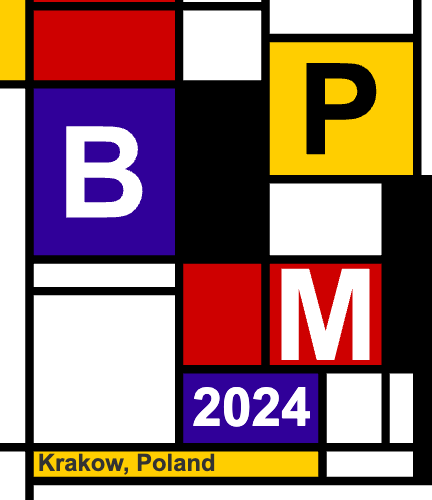Call for Proposals
PhD students working in the area of Business Process Management (BPM) are invited to submit their proposals for participation in the BPM Doctoral Consortium, which will be held on the 1st of September 2024, in conjunction with the 22nd International Conference on Business Process Management (BPM 2024) in Krakow, Poland.
The Doctoral Consortium has the following objectives:
- To provide PhD candidates with valuable feedback on their research proposals
- To provide PhD candidates with helpful guidance on research methods and future work
- To provide PhD candidates with opportunities to meet and interact with experienced researchers in the area of Business Process Management
- To promote the development of a community of scholars including both peers and mentors for improving future careers
We welcome submissions on a wide range of topics related to BPM, from different disciplines, such as information systems, computer science and organizational and management science. The PhD research topic must be already well-defined but could still benefit from open discussions on continuing the research. There are no limits as to the topic and research methods per se. We expect that submissions are mature enough to contain a roadmap for the remainder of the PhD project.
Participants of the DC are asked to make a strong case for the relevance of their work for BPM research and practice. The PhD candidates of the accepted proposals are expected to present their research at the Doctoral Consortium and to discuss their plans with other PhD candidates and senior researchers. Participants will benefit from the advice of senior researchers in the field and from the interaction with peers being at a similar stage of their careers.
Submission
PhD students interested in engaging in detailed discussions on their research at the Doctoral Consortium are invited to submit a (short) paper that outlines their thesis work and clearly describes:
- The research problem being addressed
- The research methodology and techniques being applied
- The (intended) solution being proposed, highlighting its uniqueness and its validity
- The relation of the work to the state of the art in BPM research
- The results achieved so far, open points forming a roadmap for the remainder of the PhD project, and problems identified threatening the method, results, or ambition.
The paper should be discussed with and approved by the respective PhD supervisor before submission. It should be written in English and should adhere to CEURART submission formatting guidelines (for instructions and style sheets see https://ceurws.wordpress.com/2020/03/31/ceurws-publishes-ceurart-paper-style/). The paper page limit is 5 pages (excluding the bibliography). It should be submitted to the Doctoral consortium track via the BPM 2024 Doctoral Consortium EasyChair Submission Website. Accepted submissions will be published as online CEUR proceedings.
Questions should be directed at the Chairs through bpmdc2024@easychair.org.
Review Process
Submitted proposals will be reviewed by the Doctoral Consortium Committee. The reviewers will assess each proposal based on its originality, its potential for advancing the BPM field, and whether the work is at a stage where the PhD candidate can benefit from participating in the consortium. All submissions will receive written feedback. Confidentiality of submissions will be maintained throughout the review process.
Notification
Authors will be notified of the result of their submission by email. Accepted doctoral candidates will receive instructions on how to submit a camera-ready copy of their paper and will receive information on the preparation of the presentation (see “At the Conference” next).
At the Conference
Accepted submissions will be presented at the Doctoral Consortium, which is a venue open only to participants. Attendance at the Doctoral Consortium is free of charge for accepted students. Accepted students are expected to fully commit themselves for the entire duration of the doctoral consortium and be open to new ideas and suggestions. They are also expected to provide ideas and suggestions to other participants. All accepted contributions will be circulated among the participants about one week before the consortium and student discussants will be assigned to facilitate active participation.
The Doctoral Consortium will provide a full-day program focused on helping PhD students find their path through their PhD project. PhD students will be working in smaller groups together with senior researchers. Each student will present her/his work with substantial time provided for discussions and questions by participating researchers and other students. In addition, PhD students and senior researchers will come together to discuss experiences of doing a PhD project, share challenges, and share lessons learnt. Further instructions will be sent in the acceptance email.
Participants are strongly encouraged to attend the main conference (registration fee for the main conference is not included in the doctoral consortium attendance).
Key Dates
- Paper Submission:
5 June 202412 June 2024 - Notification of acceptance: 5 July 2024
- Camera-ready copy: 5 August 2024
- Consortium: 1 September 2024
Deadlines correspond to anywhere on earth (‘AoE’ or ‘UTC-12′)
Doctoral Consortium Chairs
- Han van der Aa, University of Vienna, Austria
- Benoît Depaire, Hasselt University, Belgium
- Marta Indulska, The University of Queensland, Australia
PC Members
- Chiara Ghidini, Free University of Bozen-Bolzano, Italy
- Dirk Fahland, Eindhoven University of Technology, the Netherlands
- Inge van de Weerd, Utrecht University, the Netherlands
- Jana-Rebecca Rehse, University of Mannheim, Germany
- Jochen De Weerdt, KU Leuven, Belgium
- Luise Pufahl, TU Munich, Germany
- Michael Rosemann, Queensland University of Technology, Australia
- Michael Zur Muehlen, Stevens Institute of Technology, USA
- Moe Thandar Wynn, Queensland University of Technology, Australia
- Monique Snoeck, KU Leuven, Belgium
- Peter Fettke, German Research Center for Artificial Intelligence (DFKI) and Saarland University, Germany
- Sander J.J. Leemans, RWTH Aachen, Germany
- Shazia Sadiq, The University of Queensland, Australia
- Stefanie Rinderle-Ma, Technical University of Munich, Germany
- Thomas Grisold, University of St. Gallen, Switzerland
